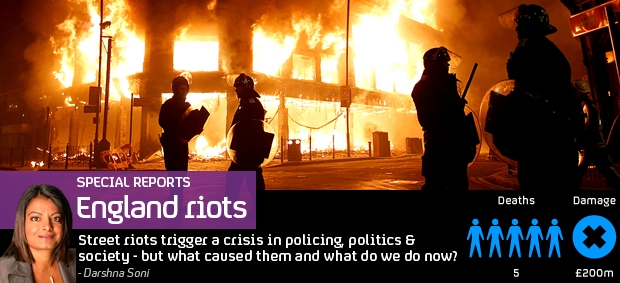Half a million ‘forgotten families’ need help – riots report
The long-awaited report into the 2011 riots says poor parenting, a sense of hopelessness among young people, unemployment and a materialistic culture were to blame for the disturbances.
It says there are 500,000 “forgotten families” who “bump along the bottom” of society and need support.
In its response to the riots, the government is focusing on 120,000 troubled families, but the Riots, Communities and Victims Panel says there is little evidence that rioters are from these families.
The panel says the rioters are drawn from a wider group of 500,000 families who have problems, but are not receiving intensive support from public services.
Up to 15,000 people took part in the riots in London and other English cities in August 2011, most of them under 24, with poor school attainment records.
Five people died, 5,000 crimes were carried out and the economy suffered £500m worth of damage.
Acquisitive
The panel, set up last year, says the unrest was characterised “by opportunistic looting and very much targeted at brands”, with half of all recorded offences acquisitive in nature.
The communities affected blame poor parenting and although they want to see rioters punished, they also believe rehabilitation is the best way of preventing future crimes.
Those brought before the courts had on average 11 previous convictions, and the panel argues that custodial sentences are not always appropriate and should sometimes be replaced with community punishments.
When people don’t feel they have a reason to stay out of trouble, the consequences for communities can be devastating. Darra Singh, Riots Panel
With youth unemployment at a record high, it wants the government to provide a job guarantee for all young people who have been out of work for two years or more.
Fine schools
It cites a lack of confidence in the police and says schools should be fined if they fail to teach children to read and write properly.
About a fifth of school leavers have the literacy skills of an 11-year-old or younger, leaving many with no stake in society and no reason to stay out of trouble.
The panel says that introducing fines, which would be used to help bring children up to the required standards, would help ensure the risk of future riots on the scale seen in 2011 was “significantly reduced”.
Darra Singh, the panel’s chairman, said: “We must give everyone a stake in society. There are people ‘bumping along the bottom’, unable to change their lives.
“When people don’t feel they have a reason to stay out of trouble, the consequences for communities can be devastating, as we saw last August.”
The report says most of the shops targeted by rioters sold “high-value consumer products”, including designer clothes, trainers, mobile telephones and computers.
Materialism
It says that most people it surveyed believe materialism among young people is a problem and that steps need to be taken to reduce the amount of advertising.
“While no one individual brand is to blame, children and young people must be protected from excessive marketing, while supporting business and not harming commerce.”
The panel calls on the Advertising Standards Authority to make the impact of advertising on young people a feature of its new school education programme “to raise resilience among children”.
It warns that there is a perception that the gap between rich and poor is growing and says “businesses have a clear role giving something back to society and making progressive steps to sharing wealth and providing opportunities for individuals to achieve a stake in business”.
